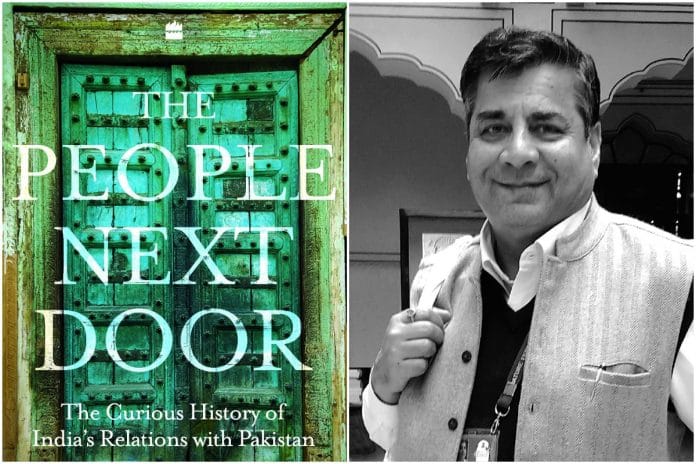There is no greater vehicle for high drama, low farce, and ultimate tragedy, than the relationship between Pakistan and India.
Whatever one may say about The People Next Door: The Curious History of India’s Relations with Pakistan, It’s forthright.
Smack in the beginning, author T.C.A. Raghavan tells us what his book isn’t. ‘My book is not a policy book,’ he writes, ‘but a history book.’ He also admits that this is, ‘needless to say’, an Indian perspective on the ‘deeply contested’ past and present.
Most readers would pick that up from the title. If Two Neighbours would imply bonhomie, The People Next Door are alien others, to be glanced at with suspicion, and preferably through a brick wall. That Raghavan did much of his glancing based out of the Diplomatic Enclave in Islamabad, tells us an old truth: distancing language can cover only so much distance.
That said the reader would do well to take the author’s disclaimers, sincerely made, in stride. But then there’s another quibble: what of that “deeply contested …present” he mentions?
After all, The People Next Door sprints through the first 50 years of neighbourhood drama, slows down around the time Musharraf and Vajpayee begin slowing down, and then bows out. The irresistible impression is that this book was published in the middle of the Bush era (if it ever ended), and an updated epilogue was tacked on at the end – a curious achievement for a 2017 release.
But prescient as ever, the author has an answer to that as well, “…As we come closer to our own times I close the story rather abruptly”, he explains. “In my view, the past always needs to incubate before its history can be attempted.”
For the reader, that is unfortunate. Raghavan was deputy high commissioner in Islamabad from 2003 to 2007, and high commissioner from 2013 to 2015; the years he saw the Pakistan-India equation the closest, are the same years he accords such little space in his book.
It is hoped that once the passions have cooled, there will be another volume in the offing – for while the author is right when he says the past requires incubating, James Baldwin makes the opposite case just as well: “History is not the past, it is the present. We carry our history with us. We are our history.”
By the end of The People Next Door, we reach a similar conclusion. For any Martian reading this book, it would seem that over the seven decades of crosstalk, Delhi had all the best lines. Nehru calls Ghulam Muhammad’s men ‘daftaris’, Shastri placates Ayub, ‘main bahut muafi chahta hoon ki main (Kashmir ke) mamle mein aap ki koi khidmat nahin kar sakta,’ and Vajpayee, the star of this show, can only belt out zinger after zinger.
By contrast, their opposing number is depicted as a ball of reaction – ladies and gents of little agency and gelatinous shape. This is not to say that the author is ungenerous with Pakistani sources, precisely the opposite. It’s to say that he only ever catches them in a state of surliness or self-doubt – when the Pakistanis aren’t reeling from yet another Indian gambit, they’re engaged in the most tortured navel-gazing.
But the best repartee flows both ways, and it would have added to the book’s colour to read that Zulfikar Bhutto referred to Indira Gandhi as a ‘diligent drudge’ of a schoolgirl, words that nearly scuppered the Simla Agreement; that Vajpayee said at General Zia’s funeral ‘Woh asli guru tha; usne America ko nachaya, Russia ko chakraya aur hamein sataya,’ or that Benazir’s hopes for peace rested on the reluctant shoulders of Rajiv Gandhi.
All said and done, it would do little to detract from the author’s interpretation of events to have depicted the Pakistanis as every bit as human, as noble, and as earnest as India’s. The book, however, would take far longer to write.
Yet even adjudged as an Indian perspective, the author divorces the people next door from the street they both live on. He rightly spends time on the hideous Mumbai attacks, the Lashkar-e-Taiba, and its diplomatic fallout. Contrast this with the Tehrik-i-Taliban Pakistan – a decade-long insurgency and Pakistan’s gravest existential crisis – which merits a single reference in the epilogue. That Rawalpindi’s fears are premised on their neighbour’s involvement, escapes mention altogether.
Nor does the same discretion apply to histories that skew westward.
The author singles out his countrywoman Sarmila Bose’s Dead Reckoning, a take on the 1971 war that remains popular in Pakistan. “What is striking is how one single book by a scholar becomes such a palliative to many in Pakistan today,” he wonders. Considering Raghavan spends two whole pages slamming Bose’s version – out of just seven on the war altogether – he may be guilty of the same charge.
In any event, it may take forever for a book to satisfy both sides (and even longer, one suspects, to satisfy just one). But that was not the author’s goal, ever. The fact is, there is no greater vehicle for high drama, low farce, and ultimate tragedy, than the relationship between Pakistan and India, and Raghavan understands as much.
The People Next Door has been written with zest; the author knows which points to press at and where. The prose is clear and the passive voice rarely shows up. Academic jargon is nowhere to be found, and jingoism (or, for that matter, any words that end with –ism) is minimal.
Asad Rahim Khan is a lawyer and columnist based in Pakistan.
Also read the book review by an Indian reviewer by Urvashi Sarkar







Great review